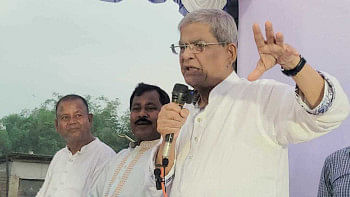The pot calling the kettle black
THE brouhaha following the nocturnal call at the political HQ of the BNP by some serving public servants (some prefer to call them servants of the republic) a few days ago was predictable. And predictable too has been the reaction of some of the ruling party members who threatened not only stern action against the said officials but also to prosecute the leader of the opposition for alleged conspiracy against government.
We do not know what transpired between the visiting members of the public service and the BNP leadership but the timing of the visit has raised many eyebrows as it should. However, what one fails to understand is the reaction of the AL to the purported intention of the night-time meeting. And I hasten to add that not for a moment am I condoning an action which is tantamount to severe breach of service rules.
Meeting political leaders cannot and is not an anathema but then there is a time for everything, and a season for every activity under the heavens. A gospel truth that appears to have been contravened and those that are guilty of that breach must face the consequences of their action.
But my purpose today is not to pass judgment on actions of public servants but to see this episode as the outcome of the Manichean mindset created by the attitude of the political parties towards public servants across the board and how they have treated the 'servants of the republic' during their respective tenures. There is an underlying sub text of the issue that we should dilate on since that has to with an important institution whose performance is inextricably linked with good governance.
While not for once trying to condone the act of the civil servants, AL reaction seems like the pot calling the kettle black. Although many of us take comfort in selective amnesia our memory cannot be so bad as to have forgotten the fact it is the AL which was the beneficiary of the so-called Janatar Mancha organised by senior bureaucrats in 1996. The Mancha acted as a catalyst in forcing the BNP to hasten its decision to relinquish power. It would be disingenuous to deny that the so-called Janatar Mancha was the most blatant breach of service rules. And no one has been called to account for that. On the contrary the leaders of the Mancha have been and continue to be rewarded for what they did. And that has had the most toxic effect on the bureaucracy as a whole. What we saw the other day is delayed fallout of politicisation of the bureaucracy, unfortunate and unwarranted as that may be.
While politicisation of the administration is not the exclusive preserve of any one particular party we have seen politicisation increase exponentially. It was unfortunate that during the time of politically elected governments partisan attitude divided the bureaucracy into 'ours' and 'theirs.' The inevitable result was denudation in the quality of the bureaucracy since party fealty got preference over merit and competence, because all of 'ours' cannot be top class and neither all of 'theirs' is of poor quality.
In the past, not only the civil service but the military was also infiltrated to create an insurrection, which was partly successful. But the only outcome of that was the death of many officers. And the protagonists of that policy, some of whom are in top positions of the government today, make no secret of what they tried to do, quite unabashedly.
A very odious manifestation of the politicisation of the bureaucracy is the large number of OSDs. Nearly 500 government servants are being paid for doing nothing because they belong to the 'other group' whereas, many that belong to 'us', have been promoted without appropriate vacancies. Thus, with some notable exceptions, these people feel obligated not to the state or the people but to the party. And that shows in their actions and words. Just go through the recent statement of the Chittagong Police Commissioner which reads like the statement of a ruling party apparatchik rather than a public servant.
For the ruling party to use public servants for political ends is not only illegal it is also immoral, more so when largesse is dispensed in return for their allegiance. As for the BNP, to exploit disgruntled people in the administration for political dividend speaks of the bankruptcy of the party. In both instances, temporary gains if any far outweigh the long term harmful effect on the bureaucracy as a whole.
Can the situation be corrected? Only Providence knows.
The writer is Editor, Oped and Defence & Strategic Affairs, The Daily Star.

 For all latest news, follow The Daily Star's Google News channel.
For all latest news, follow The Daily Star's Google News channel. 



Comments